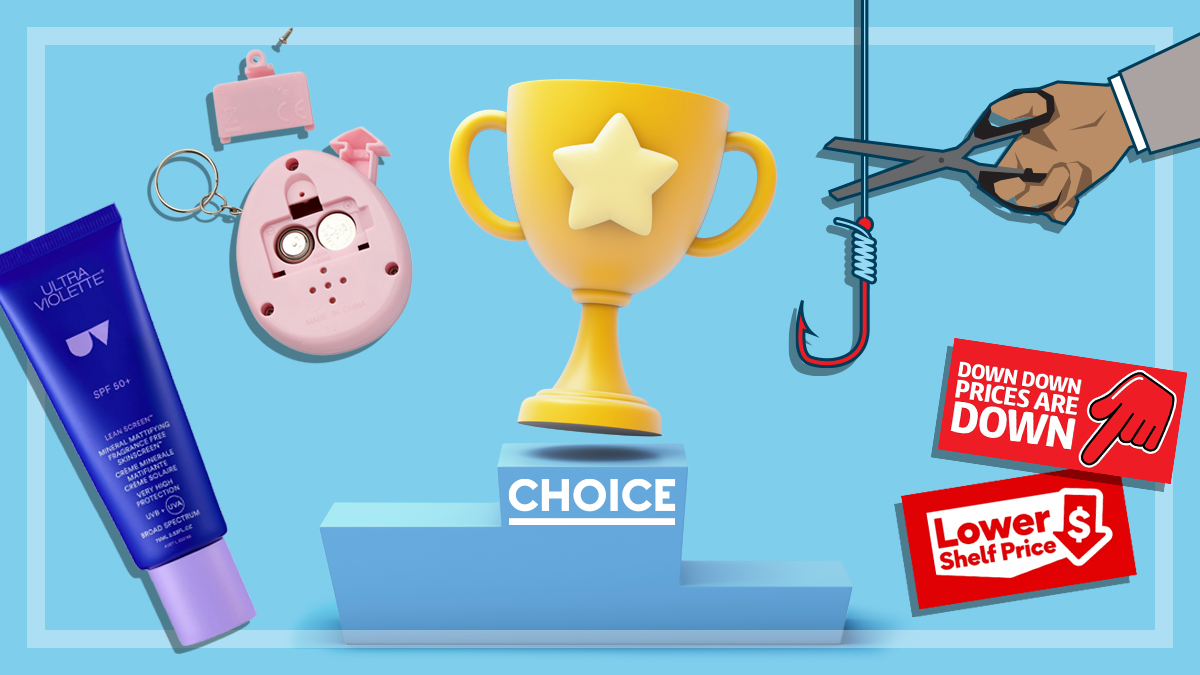Get our independent lab tests, expert reviews and honest advice.
5 ways to take control of your consumer rights

After 60 years of working to make consumer rights stronger, our recent research shows that more than 50% of Australians are confident using the Australian consumer law.
That’s great news, but it means we still have work to do to ensure everyone knows what they’re entitled to.
To find out more, read our top five things you can do right now to take control of your consumer rights (or for more detail, download our comprehensive consumer rights guide).
1. Play the market
Your blind loyalty to a business or service could be costing you a fortune. Make sure you’re not wasting your money by regularly seeking out better deals.
Whether it’s your energy bill, home loan or health insurance, there is almost certainly a better deal in the market.
- Test their loyalty. If you find a cheaper rate or better service, contact your current provider and demand they match or better it.
- Don’t pay for things you don’t need. You may be paying top dollar for services you’ll never use, such as health insurance extras you don’t get value from.
- Ditch your default. Do away with that expensive and underperforming bank and superannuation accounts.
- Don’t trust commercial comparison sites. Comparison sites prioritise deals from companies that offer them the best financial incentives, not their customers. Compare the market yourself with just a couple of phone calls or web searches.
2. Keep records
Keeping a record of your contact with businesses puts you in a much stronger position when it comes to queries, comparisons and exchanges and refunds.
I lost my receipt, what can I do?
A receipt isn’t your only option for proof of purchase. You can also use your:
- bank statement
- layby agreement
- verbal reference number
- warranty card
- product serial or production number
- photocopy or photograph of the original receipt.
Everyone has the same rights under the Australian Consumer Law, but you’ll find it easier exercising those rights if you’ve kept good records.
“Evidence is everything,” says CHOICE consumer law expert Julia Steward. “Ideally your consumer rights are respected by the company you bought from or the manufacturer, but if it ever needs to go to a court or a tribunal, evidence will be particularly important.”
“You shouldn’t have to hire a lawyer to assert your consumer rights, but if it ever gets to that, your record keeping will increase your chances of a good result.”
3. Know your rights
Australian businesses are bound by the Australian Consumer Law, and getting to know your consumer rights will help you if you ever have to use them.
Here are a few tips for if you have an issue with a product. For more detail, read the full government guide to your consumer rights.
- Don’t pay for rights you already have. Avoid buying extended warranties. In many cases they provide little to no extra benefit over what you’re entitled to under Australian Consumer Law.
- If you have a problem, approach both the retailer and manufacturer. You can choose who to complain to based on which is most convenient for you to deal with, but complaining means you can decide who can resolve your problem most effectively.
- Play to your strengths. Are you better at complaining in-person? Great on the phone? More confident when writing? If you have a complaint, choose the method that you’re strongest in or ask a friend for help.
- Unhappy with the response? Ask to speak to someone more senior, contact your local fair trading organisation, approach the industry’s professional body or share your story in a public forum.
“I’ve seen companies play legal games for months or years over a consumer issue, only to fold the moment you say you’ll go public,” says CHOICE consumer advocate Jonathan Brown.
“There are also companies that respond to formality, and others that respond to an authority like a regulator. The key is to know what your rights are, and to be assertive and confident.”
4. Use your voice
More than 200,000 people help CHOICE change Australia for the better. You can join them and take action now by participating in CHOICE campaigns. There are also other practical things you can do on any consumer issue you’re passionate about.
- Tell your local MP why your issue matters. Write them a letter or ask for a meeting and share your personal story.
- Switch companies and tell people why. Opt out but tell the company why you’re leaving. Losing customers is one of the most effective ways to make it change its policies or behaviour.
- Help investigate. Your research can make waves. Our CHOICE community forum is a place where you can share your findings.
“Many of the biggest reforms to consumer rights have happened because of support and action from the CHOICE community,” says CHOICE director of campaigns Erin Turner.
“Without people sharing their stories and demanding change, we never would have seen the Banking Royal Commission or big reforms like the ban on unfair card surcharges.”
“People like you sharing your stories with CHOICE has helped us secure better laws, get unsafe products pulled from shelves and made our community a fairer, safer place.”
You can take control of your consumer rights by using your voice to change laws, get unsafe products fixed or off shelves and make sure businesses treat us fairly.
5. Beat the tricks
Sales tricks are nothing new. Humans have been using sneaky tactics to sell things to each other for thousands of years. But consumers now have more resources than ever at hand to beat the tricks.
- Get a “do not knock” sign. Keep sales people from your doorstep with a simple sign. Download yours here and place it near your front door.
- Sign up to the “do not call” register. Avoid unsolicited telemarketing calls by adding your number to the government’s Do Not Call register.
- ‘No returns’ signs are illegal. Businesses can’t enforce “no returns” rules if a product is faulty. Read more about your rights to refunds and returns.





